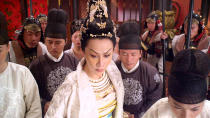Film Review: ‘Young Detective Dee: Rise of the Sea Dragon’

Raising the bar sky-high for Chinese blockbuster entertainment, Tsui Hark’s “Young Detective Dee: Rise of the Sea Dragon” lays out a gargantuan feast of 3D spectacle, high-wire martial arts, splendiferous period aesthetics, intelligent sleuthing and even an ancestor of “Pacific Rim’s” kaiju. A prequel to Tsui’s 2010 hit, “Detective Dee and the Mystery of the Phantom Flame,” this mystery-actioner-costumer is energized by a youthful cast and proves more cohesive than the overwrought original. Anticipated fall release is set to raise a tidal wave in domestic B.O., supplemented by monster ancillary potential, though the voluminous historical background may intimidate foreign audiences.
The first production shot in stereoscopic 3D by Huayi Brothers Media, and Tsui’s second 3D project since “Flying Swords of Dragon Gate” (2011), “Young Detective Dee” successfully uses the technology to bring to life the ancient splendor of the Tang Dynasty, an age comparable to the Renaissance for its cultural diversity, international business activity and artistic freedom. Few Chinese films have amassed such a cornucopia of period artifice, yet Tsui also draws on the era’s corruption and political tyranny to hold up a mirror to contempo realities, while his use of political subtext here is subtler and more macabre than usual.
Fire was the central motif of “Phantom Flame,” and as the title of “Sea Dragon” would suggest, water is the key element here. The yarn is set in 665 A.D., during the joint reign of Empress Wu Zetian (Carina Lau) and Emperor Gaozong (Sheng Chien). The country is at war with the Buyeo kingdom, and during one of their sea battles, the Tang navy is crushed by a monster from the ocean depths. Rumors spread that the Sea Dragon (the Chinese equivalent of Poseidon) has been provoked, and Wu orders an investigation by Yuchi Zhenjin (Feng Shaofeng, “Painted Skin: The Resurrection”), head of the Dalisi, an organization tasked with upholding law and order.
Like Barry Levinson’s “Young Sherlock Holmes” (1985), “Young Detective Dee” revisits a master sleuth’s first case to uncover formative life influences. Di Renjie, or Dee (Mark Chao of “Monga,” replacing Andy Lau), arrives in the capital, Luoyang, to serve as a Dalisi magistrate. Lipreading a plot to kidnap Yin Ruiji (Angelababy) the capital’s most beautiful courtesan, he rushes to her rescue, only to be beaten to it by a Kappa, a green, scaly creature that vanishes into a lotus pond.
At nightfall, the Kappa reappears to Yin, who recognizes him as her lover, Squire Yuan Zhen (Ian Kim). A handsome and cultivated scholar, he’s been missing for months from his family teahouse. His transformation offers clues to a court conspiracy that implicates the Dondoers, a fishing tribe living on an island teeming with bats and Tryffids.
The plot cooks up various gimmicks including parasitic infestation and uretic homeopathy, but but unlike the runaway ideas present in some of Tsui’s other works, these devices slot neatly into the script’s overall scheme, also serving as apt metaphors for the corrupt aristocracy. Though the film could be trimmed down from its 133-minute running time, Tsui and co-scribe Chang Chia-lu (who penned the first “Dee”) have exercised greater discipline in crafting a mostly linear narrative. In their hands, the emergence of the titular Sea Dragon delivers a payoff of “Release the Kraken!”-like proportions.
Amid action that flies as swiftly as a Ninja dart, Tsui finds room to to nurture a bromance between Yuchi and Dee, and weaves in a number of amusing anecdotal episodes, as when Dee uses his deductive genius to make prison doctor Shatuo Zhong (Lin Gengxin) his sidekick. Coming off as brilliant, playful and smug in a boyish way, Chao turns out to be a major asset in Tsui’s fledgling franchise, and reps an improvement on Lau’s drily earnest Dee. A solid thesp who rarely overacts, Feng brings quiet integrity to the role of the stern enforcer whose arrogance gives way to admiration for Dee.
Although it’s the catalyst for all the tumult, the beauty-and-the-beast romance of Yin and Yuan remains a secondary matter, as neither Angelababy nor Kim possesses enough personality beyond doll-like prettiness to make the characters’ plight moving. The pivotal figure remains Empress Wu, whose pagoda-high coiffure suggests a gauche rejoinder to the idea of phallic domination; magisterially played by Lau, she could launch a thousand ships with one raise of a pencil-thin eyebrow.
Veteran action director Yuen Bun recaptures the style of gravity-defying wire-fu that Tsui helped popularize in the early ’90s, enhanced with 3D that works seamlessly in the fight scenes, but proves effective in the blurry underwater sequences. For all the elaborate technique on display, the fight scenes do drag a little, enough to make the moves look repetitive.
Production values are lavish. Heady crane shots abound in Choi Sung-fai’s sweeping cinematography, while the richly wrought sets, costumes and murals look radiant throughout.
Get more from Variety.com: Follow us on Twitter, Facebook, Newsletter
